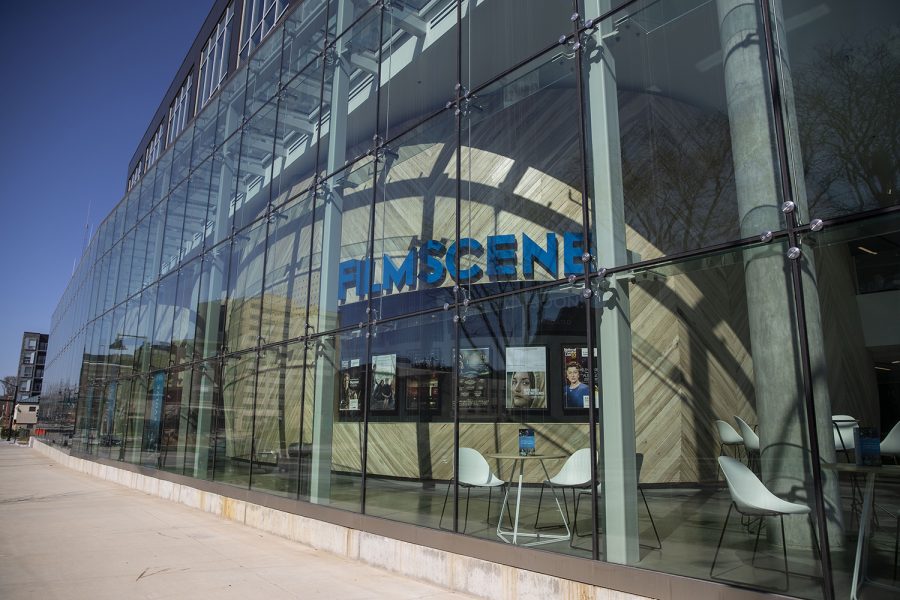Obermann Center symposium’s ‘Frequências’ film festival explores Afro-Brazilian cinema
The festival examined contemporary Afro-Brazilian cinema through a collection of film, lectures, and interventions discussing the Black diaspora.
Filmscene is seen on April 15, 2020.
April 2, 2023
The door of no return; the reinvention of belonging; Blackness in Brazil; these topics and more were the focus of this year’s Obermann Humanities Symposium.
Presented in Iowa City by the Obermann Humanities Symposium & International Programs Major Project Award, the “Frequências” festival displayed lectures, cinema screenings, interventions, exhibits, and performances by contemporary Afro-Brazilian artists and scholars discussing Black diaspora.
The festival kicked off on Thursday in FilmScene at The Chauncey. Janaína Oliveira from the Federal Institute of Rio de Janeiro and Christopher Harris, UI associate professor of cinematic arts, gave opening lectures. A screening of Grace Passô’s “República & Vaga Carne (Dazed Flesh),” a film exploring the meanings of Black feminine bodily autonomy, concluded the first night.
For all non-Portuguese speakers, there were subtitles and translators available. UI student John Hixson is currently enrolled in an accelerated elementary Portuguese class and was excited to attend the screening and learn more about culture and language.
“It was really good to hear the words in Portuguese how the natives speak it. I could hear how they pronounce it versus how we pronounce it and hear their sentence structure. So, I thought it was valuable in that aspect,” Hixson said.
Friday’s events began at the Stanley Museum of Art with an exhibition by Aline Motta titled “Crosscurrents in Time: A Video Trilogy,” installed and open to experience until Aug. 1. Motta is an artist from Niterói, Brazil, who explores refusing liner time, and building history back up because of colonial erasure. The trilogy is presented in a dark room with three screens all displaying a different shot.
The exhibition’s opening was followed with an intervention given by Tatiana Carvalho Costa, Michael B. Gillespie, andChris Lira. The festival’s interventions were structured as short lectures to serve as an outlet to raise uncomfortable questions about gender, race, nationality, and colonialism.
Carvalho Costa is a doctoral student at the Federal University of Minas Gerais in Belo Horizonte, Brazil, researching Afro-Brazilian epistemologies and Black Brazilian cinema. Carvalho Costa’s portion of the intervention presented the history of slavery in Brazil and how it affects her to this day.
She explained how she found out from her research that her last name is descended from a colonizer, and that there is still a group in Benin who honor the name for the sake of not erasing history. Carvalho Costa continued in saying that Black cinema is a way to preserve those histories in self-determinism and make new ones for people today.
RELATED: Afro-Brazilian film to take center stage in ‘Frequências,’ 2023 Obermann Humanities Symposium
Gillespie is an associate professor of cinema studies at New York University. He followed Carvalho Costa with a similar sentiment in his lecture, covering the sense of the art of Blackness.
“These new approaches might insist on reading the artistic and epistemological consequences of Black film and media,” Gillespie said. “The very idea of Black film and media is defined by historiography over history performativity over notions of essential identity, affect over and body truth.”
The first intervention concluded with a poetry reading by Lira, a professor in the department of romance language at the University of Georgia, but who used to teach here at the UI before COVID-19, when Frequências was still in the beginning stages of development.
The readings were excerpts from “Raízez: Brazilian Women Poets in Translation,” a bilingual collection of poems edited by Lira herself and an associate at the University of Georgia. The audience was invited to join in on the readings passed out by teaching assistants Gleisson Alves Santos and Victória Lane Silva.
“I’m very excited to see how the symposium happening in a city in like this brings a lot of Black women, predictions, art works, and very important discussions, how is it going to be in a city such as Iowa City, a city that is very alive, and there is a very rich, artistic scenario, a lot of people very interested in arts in general,” Alves Santos said.
Lane Silva expressed a similar sentiment, noting the difference in perspectives that Frequencias would bring.
“When you have the opportunity to hear from different voices, you better understand the place, understand better the interactions that you have in daily life. So, I feel like this is one of the most important things about having an event here,” Lane Silva said.
Friday’s events continued with an artist talkback from Motta, a second round of interventions with Miryam Charles and Motta, and a performance titled “Black Utopia LP” by Cauleen Smith, though the reception was canceled due to the severe weather that evening.
Saturday consisted of six screenings at FilmScene at The Chauncey, the final round of interventions with Janaína Oliveira, Yasmina Price, and Smith, and five more final screenings to close out the festival.



